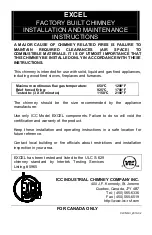
Stratford
Fireplace Installation and Operation Manual
24 _____________________________________________________________________
4.4.6.4
Maximum Burn Cycle Times
The burn cycle time is the period between loading wood on a coal bed and the consumption of
that wood back to a coal bed of the same size. The flaming phase of the fire lasts for roughly the
first half of the burn cycle and the second half is the coal bed phase during which there is little or
no flame. The length of burn you can expect from your fireplace, including both the flaming and
coal bed phases, will be affected by a number of things, such as:
•
firebox size,
•
the amount of wood loaded,
•
the species of wood you burn,
•
the wood moisture content,
•
the size of the space to be heated,
•
the climate zone you live in, and
•
the time of year.
The table below provides a very general indication of the maximum burn cycle times you are likely
to experience, based on firebox volume.
FIREBOX VOLUME
MAXIMUM
BURN TIME
<1.5 cubic feet
3 to 5 hours
1.5 c.f. to 2.0 c.f
5 to 6 hours
2.0 c.f. to 2.5 c.f.
6 to 8 hours
2.5 c.f. to 3.0 c.f.
8 to 9 hours
>3.0 c.f.
9 to 10 hours
Long burn times are not necessarily an indication of efficient fireplace operation. When you are
home during the day and able to tend the fire, it is preferable to build a smaller fire that might
provide three or four hours of heating than to fully load the firebox for a much longer burn.
Shorter burn cycles make it easier to match the heat output of the fireplace to the heat demand of
the space.
4.4.6.5
How to place the logs
In fireboxes that are roughly square, wood can be loaded so that looking through the glass door
you see the ends of the logs (north-south) or the sides of the logs (east-west). In all cases, wood
should always be placed behind the andirons.
East-west loads that are built compactly break down slowly when heated, but the amount of wood
you can load is limited because if you put in too many pieces, one may fall against the glass. East-
west loads are excellent for long, low output fires for relatively mild weather.
North-south loads break down more quickly, but much more wood can be loaded at a time. This
makes north-south loading good for high output, long lasting fires for cold weather.
















































